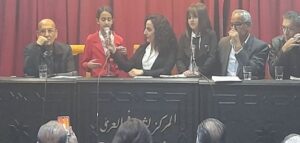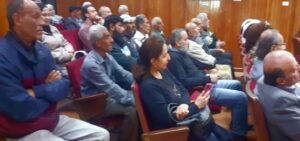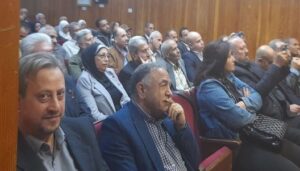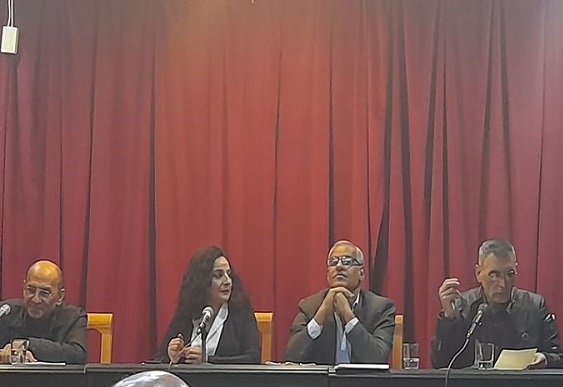A symposium was held recently at the Arab Cultural Center in Abu Rummaneh in Damascus entitled “The effects of Al-Aqsa Flood Operation in culture and media”.
Secretary of the Popular Front for the Liberation of Palestine, General Command Anwar Raja talked about the necessity of reading the messages presented by the Al-Aqsa Flood operation regarding the issue of the conflict with the enemy, which were linked to the future of the region and the fate of the Arab and Islamic nations. He pointed out that the operation revealed the strong connection and identification between American interests and the Zionist occupation entity.
 Journalist and media figure, Najwa Saliba, told Syria Times that since the beginning of the Al-Aqsa flood in 2023, a group of poets and writers have been documenting these moments of victories and heroisms. In return, they documented the massacres committed by the Zionist occupation in the occupied territories in Palestine and then in southern Lebanon.
Journalist and media figure, Najwa Saliba, told Syria Times that since the beginning of the Al-Aqsa flood in 2023, a group of poets and writers have been documenting these moments of victories and heroisms. In return, they documented the massacres committed by the Zionist occupation in the occupied territories in Palestine and then in southern Lebanon.
“Every day there is a new event and every day there is a corresponding event from the Lebanese resistance and the Palestinian resistance. The symposium is about the impact of the Al-Aqsa Flood operation on the media. How did the media change and change its policy to cover all these events” she said.
 “We talked about forums and cultural centers. How did you hold activities related to the Al-Aqsa Flood and its impact on culture and media. Our message is that the intellectual is an integral part of his society, environment and country’s politics” she added.
“We talked about forums and cultural centers. How did you hold activities related to the Al-Aqsa Flood and its impact on culture and media. Our message is that the intellectual is an integral part of his society, environment and country’s politics” she added.
Critic and media figure Allam Abdel Hadi stressed in the symposium on Al-Aqsa Flood operation and its impact on the media from an intellectual perspective. He talked about how the Arab culture presented the Al-Aqsa Flood Operation and how it dealt with it, what it showed, and what the issue offered culture.
He confirmed on how our culture interacts with the Palestinian issues in the movement of the conflict on the ground?
 He told Syria times that our message is that the issue is an issue of right, justice, and equality. Culture has to have another approach instead of the affected and passive approach, so that the active is the influence of media in correcting concepts.
He told Syria times that our message is that the issue is an issue of right, justice, and equality. Culture has to have another approach instead of the affected and passive approach, so that the active is the influence of media in correcting concepts.
Interviewed and photos : Nada Haj Khidr

